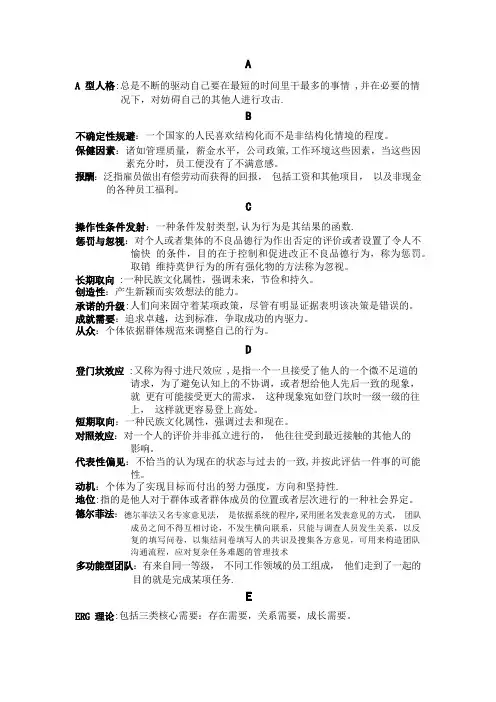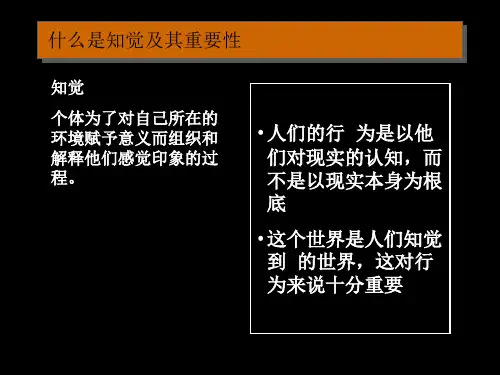组织行为学 中文版
- 格式:ppt
- 大小:239.50 KB
- 文档页数:39



总是不断的驱动自己要在最短的时间里干最多的事情 ,并在必要的情况下,对妨碍自己的其他人进行攻击.,工作环境这些因素,当这些因素充分时,员工便没有了不满意感。
包括工资和其他项目,以及非现金的各种员工福利。
,认为行为是其结果的函数.愉快的条件,目的在于控制和促进改正不良品德行为,称为惩罚。
取销维持莫伊行为的所有强化物的方法称为忽视。
一种民族文化属性,强调未来,节俭和持久。
人们向来固守着某项政策,尽管有明显证据表明该决策是错误的。
又称为得寸进尺效应 ,是指一个一旦接受了他人的一个微不足道的请求,为了避免认知上的不协调,或者想给他人先后一致的现象,就更有可能接受更大的需求,这种现象宛如登门坎时一级一级的往上,这样就更容易登上高处。
他往往受到最近接触的其他人的影响。
,并按此评估一件事的可能性。
.指的是他人对于群体或者群体成员的位置或者层次进行的一种社会界定。
德尔菲法又名专家意见法,是依据系统的程序,采用匿名发表意见的方式,团队成员之间不得互相讨论,不发生横向联系,只能与调查人员发生关系,以反复的填写问卷,以集结问卷填写人的共识及搜集各方意见,可用来构造团队沟通流程,应对复杂任务难题的管理技术不同工作领域的员工组成,他们走到了一起的目的就是完成某项任务.包括三类核心需要:存在需要,关系需要,成长需要。
(也被称作反社会行为或者工作场所的无礼行为) ,是指违反重要的组织规则,从而危胁组织和个人健康的主动性行为。
自我价值的重要程度。
,他们认为个人权力高于一切。
,通过增加员工完成任务的数量和变化性,从而使工作本身更具多样化.指工作的纵向发展,他增加了员工对于工作在规则,执行和评估方面的控制程度。
群体成员共同接受的一些行为标准。
进行决策,匡助每一个成员更好的承担起自己的责任。
团队队员努力地结果导致团队绩效远远大于个体绩效之和.个体对那些并不产生反应的刺激做出回应。
如果呈现某事物,导致行为者愉快并使行动者特定行为表现频率增加,称为积极强化。








组织行为学主要看法中英文比较ability 能力absenteeism 少勤率achievement motivation 成就动机achievement need成就需要achievement/power theory 成就 /权益理论affective component of an attitude 态度的感情成分affiliation need 亲和需要arbitrator 仲裁者attitude 态度attribution 归因attributional bias 归因成见attributional model 归因模型authority 声威、权益behavioral component of an attitude 态度的行为成分 behavior theories of leadership 领导的行为理论boundaryless organization 无界线组织brainstorming 脑筋风暴法bureaucracy 官僚结构centralization 集权chain of command 指挥链change 改革change agent 改革代理人channel 渠道 ,通道channel richness 通道丰富性charisma 领导魅力;领导者的超凡魅力charismatic leadership 拥有超凡魅力的领导者chief executive officer(CEO) 首席执行官classical conditioning 经典条件反射coercive power 逼迫权cognitive component of an attitude 态度的认知成分cognitive conflict 认知矛盾cognitive dissonance 认知不协调;认知失调cognitive evaluation theory 认知议论理论cohesiveness 内聚力;凝聚力collaborating 合作collectivism 集体主义collegial model 学院模型command group 命令集体communication 沟通communication media 沟通媒介communication process 沟通过程communication networks 沟通网络compromising 妥协conceptual skills 看法解析技术conciliator 调停者conflict 矛盾conflict management 矛盾管理conflict process 矛盾过程conformity 从众content theories of motivation 内容型激励理论contingency model of leadership 领导的权变模型contrast effects 对照效应core dimensions of jobs 工作的核心纬度core values 核心价值观counseling 咨询cross-cultural communication 跨文化沟通cross-function teams 跨职能团队culture 文化decentralization 分权decisions 决策decoding 译码;解码delegation 授权Delphi technique 德尔菲法departmentalism 部门化dependent variables 因变量distributive bargaining 分配谈判distributive justice 分配公正downward communication 下行沟通dysfunctional conflict 功能失态性矛盾employee stock ownership plans〔 ESOPs〕员工持股方案encoding 编码environment 环境equity theory 公正理论ERG theory ERG 理论esteem needs敬爱需要existence needs生计需要expectancy 希望expectancy theory 希望理论expert power 专家权益face-to-face communication 当面的沟通Fiedler contingency model 费德勒权变模型formal group 正式集体formalization 正规化formalization stage 正规化阶段forming 形成functional conflict功能正常性矛盾fundamental attribution error 根本归因错误Gain sharing plan 收益分享方案goal setting 目标设置goal-setting theory 目标设置理论group 集体groupthink 集体思想growth need 成长需要halo effect 晕轮效应Hawthorne experiment 霍桑效应hierarchy of needs theory 需要层次理论higher-order needs 高层次需要horizontal conflict 横向矛盾human relations 人际关系human skills 人际技术hygiene factors 保健因素illegitimate political behavior非法的政治行为incentives 刺激;诱因independent variables 自变量individual differences 个体差异individualism 个人主义informal group 非正式集体informal leaders 非正式领导informal network 非正式网络informal organization 非正式组织information-based power 信息权information technology 信息技术instrumental values 工具性价值观integrative bargaining 整合谈判intergroup conflict 集体间矛盾internal locus of control 内部控制点internals 内控者interorganizational conflict 组织间矛盾interpersonal conflict 人际矛盾intragroup conflict 集体内矛盾intraorganizational conflict 组织内矛盾intrapersonal conflict 个人内部矛盾intuitive decision making 直觉决策lateral communication 横向沟通 Leader-Member exchange(LMX) theory 领导-员工交换理论 leader-participation model 领导参加模型 leadership 领导leadership style 领导方式leading 领导learning 学习learning organization 学习型组织learning theory 学习理论Least-Preferred Co-worker(LPC) questionnaire 最难共事者问卷legitimate political behavior 合法的政治行为legitimate power 合法权益locus of control 控制点lower-order needs 低层次需要Maslow`s theory of needs 马斯洛需求理论Machiavellianism 马基雅维里主义maintenance factor 保健因素Management By Objectives(MBO) 目标管理Management By Walking Around(MBWA) 走动式管理managerial grid 管理方格图managers 管理者;经理matrix organization 矩阵组织matrix structure 矩阵结构Meclelland`s theory of needs 麦克利兰的需求理论mechanistic organizations 机械组织meditation 调停mediator 调停者models of organizational behavior 组织行为模型Motivating Potential Score(MPS) 激励的潜藏分数Motivation激励;动机motivation-hygiene theory 激励-保健理论motivational factors 激励因素motivational patterns 激励种类Need 需要needs theories 需要理论negative reinforcement 负增强neglect 忽略;粗心negotiation 谈判;协商network 网络nominal group 名义集体Nominal Group Technique(NGT) 名义集体法nonverbal communication 非语言沟通norm 老例;标准;定额;平均数norming标准化operant conditioning 操作性条件反射organic organizations 有机组织organization 组织Organizational Behavior(OB) 组织行为organizational culture 组织文化organizational citizens 组织公民organizational design 组织设计organizational development 组织睁开organizational politics 组织政治organizational socialization 组织社会化organizational structure 组织结构organizational life cycle 组织生命周期organizing 组织Participation 参加participative counseling 参加式咨询participative leader 参加式领导者participative management 参加式管理path-goal theory 路子-目标理论perception 知觉perceptual biases 知觉成见perceptual error 知觉错误performance-outcome expectancies绩效-产出希望performance-satisfaction-effort loop 绩效-满意-努力环personal-based influence 个人影响力personal power 个人权益personality 个性;人格personality-job fit theory 个性-工作般配理论personality traits 人格特质piece rate 计件薪水piece-rate pay plans 计件薪水方案piecework system 计件工作系统planned change 有方案的改革polarization 极化political behavior 政治行为political power 政治权益politics 政治positive reinforcement 正增强position power 职位权益power 权益power distance 权益距离power need 权益需要power tactics 权益战术,机谋prejudice 成见;成见problem-solving teams 问题解决小组procedural justice 程序公正性procedure 程序process consultation 过程咨询production-oriented leader 以生产导向的领导productivity 生产力profit-sharing plan 收益分享方案projection 投射psychological success 心理成功psychological costs 心理本钱psychological contract 心理契约psychological distance 心理距离punishment power 处分性权益quality circles 质量圈qualify of life生活质量Qualify of Work Life(QWL)工作生活质量quantity of life 生活数量rationality 理性realistic job previews 实质工作预览reference group 参照集体reciprocal interdependence 互惠的相互依赖reengineering 工程再造refreezing 重新冻结referent power 参照性权益reinforcement 增强reinforcement theory 增强理论reinforcement schedule 增强程序relatedness need互有关系需要reliability信度resistance to change改革阻力reward power 奖励权role 角色selective perception 选择性知觉self-actualization 自我实现self-efficacy 自我效能self-esteem 自尊self-managing teams 自我管理小组self-serving bias 自我效劳成见sensitivity training 敏感性训练shared value 共同价值观situational leadership theory 领导的情境理论skill-based pay 技术薪水skill variety 技术多样化social comparison theory 社会比较论social-learning theory 社会学习理论Social Readjustment Rating Scale社会再适应评预计表Socialization 社会化span of control 控制幅度specification 专业化stereotyping 刻板印象storming 风暴阶段stress 压力stressors 施压源substitutes for leadership 领导的取代物survey feedback 检查反应synergy 共同作用task significance 任务重要性task structure 任务结构task team 任务小组;任务团队task uncertainty 任务不确定性team building 团队建设technical skills 技术技术technology 技术total quality management(TQM) 全面质量管理traits theories of leadership 领导特质理论transactional leaders 交易型领导turnover 离职率two-factor model of motivation 双因素激励理论type A personality A 型人格type B personality B 型人格uncertain avoidance 不确定性闪避unity of command 一致指挥upward feedback 上行反应upward communication 上行沟通valence 效价validity 效度value system 价值观系统values 价值观variable-pay programs 可变酬金方案vertical conflict 纵向矛盾work force diversity 劳动力多元化work group 工作集体work specialization 工作专业化written communication 书面沟通。
第一章组织行为学概述TAKEAWAYS重点掌握1. 1Organization behavior is a field of study devoted to understanding and explaining the attitudes and groups in organizations. More simply, it focuses on why individuals and groups in organizations act the way they do.1。
1组织行为学的研究领域是一个致力于理解和解释的态度和组织的组合。
通俗地讲,它着重于个人和组织原因群体行为的方式做。
1.2 The two primary outcomes in organizational behavior are job performance and organizational commitment.1.2组织行为中的两个主要成果是工作绩效与组织承诺。
1.3 A number of factors affect performance and commitment, including individual (job satisfaction; stress; motivation; trust, justice, and ethics; learning and decision making), individual characteristics (personality, cultural values, and ability), group mechanisms (teams, leadership), and organizational mechanisms (organizational structure, organizational cultural)1.3许多因素会影响性能,包括个人承诺,(工作满意度;压力;动机,信任,正义,道德,学习和决策),个人特征(个性,文化价值和能力),组机制(队,领导),和组织机制(组织结构,组织文化)。
Haier is the leading brand of white goods globally and the most valuable brand in China.With its 29 manufacturing plants, 8 comprehensive R&D centers, 19 overseas trading companies across the world and more than 60,000 global employees, Haier has involved into a giant multinational corporation. In 2008, Haier gained global revenue up to RMB 119 billion.海尔集团是世界白色家电领先者。
中国最具价值品牌。
海尔在全球建立了29个制造基地,8个综合研发中心,19个海外贸易公司,全球员工总数超过6万人,已发展成为大规模的跨国企业集团,2008年海尔集团实现全球营业额1190亿元。
Haier makes a great success.Why?What is it that makes people want to work harder than others? Maslow suggested that lower-order need must be met first, then higher-order need could motive workers. Herzberg’s theory showed that certain hygiene factors needed to be in place first, for example, a good basic pay. Only once these were in place could other factors be brought in to motivate workers.As a famous company, Haier pays more attention to motivating employees according to their own situation.There are many different motivation plans in haier . For example 1) The distinctive distribution system. 2) a focus on the spirit of motivation. 3), intensive training, the creation of learning opportunities.and so on . When employees do well in their work, the company rewards them in different forms. For example, merit pay plan for salesperson, profit sharing plan for manager, and skill-based pay for engineer.海尔取得了巨大的成功。